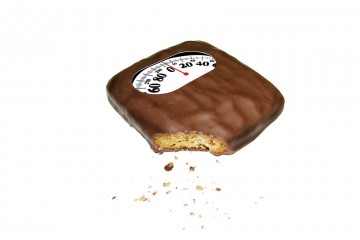It's no surprise, then, that they can also play a major role in weight loss. "When your hormones are in balance, everything about you, from the inside out, functions and looks its best," says 20 Pounds Younger author Alisa Vitti, an integrative nutritionist and hormone expert. On the flip side, when your hormonal messengers are getting mixed signals, your whole body is thrown off balance, which can stall your slim-down plans.
But there's hope: A few tweaks to your diet can clear the airwaves and get your hormones working for you, not against you. Here, Vitti shares four ways hormones can mess with your diet—and what you can to do about it.
They make you "hangry."
We've all been there at some point—downing dinner rolls as you wait at a restaurant, post-lunch stomach growls at your desk, a far-too-long food line at a baseball game—suddenly a good mood dissipates and is replaced by a hangry (hungry + angry...get it?) rage. The scary combination of hunger and anger is fueled by hypoglycemia (a common issue for women that results from a drop in blood sugar levels) and a dip in serotonin (a mood-boosting hormone that's released when you eat carbs).
The cure to keeping your mood stable—and your hand out of the bread basket? A balanced serving of healthy fats and fiber-rich carbohydrates, says Vitti. Try this super snack: half an avocado with a pinch of sea salt on toasted whole grain bread. You need both fat and carbohydrates to bring your blood sugar levels back up, without causing a spike. After you eat, your blood sugar stabilizes and your serotonin will be back in check, sending you back to your happy place.
They cause plateaus.
You exercise regularly and follow a strict diet, but can't seem to kick the last 5 pounds? Chances are it's not you, it's cortisol, says Vitti. Cortisol is the hormone responsible for telling fat cells to release stored sugar as glucose into your bloodstream. When your weight loss stalls, it's likely because cortisol stops relaying the message to your fat cells, and your body burns less stored fat for energy as a result.
Keep these important messengers moving by eating a serving of green, leafy veggies at every meal, says Vitti. Raw vegetables ensure your liver gets the crucial micronutrient glutathione, which fuels the breakdown of estrogen and keep cortisol from stalling on the job.
They make you want to eat everything in sight.
"Ghrelin" sounds eerily similar to "gremlin"—and there's an appropriate association between the two since this hunger-wielding hormone can seriously screw with even the best dieting intentions. Ghrelin is produced in your stomach, but when your stomach is empty or you're restricting calories, the hormone travels from your stomach to your brain to trigger your appetite. You'll quell the monster once you eat, but certain foods will tame it quicker than others.
A mix of lean protein and complex carbohydrates is better at suppressing the hormone than fat is, so try sliced turkey breast on a piece of whole wheat toast or ½ cup of Greek yogurt to take the edge off when you start to feel famished. Whatever you do, recognize the hungry hormone's siren call and stay away from fatty, sugary foods like ice cream, chips, or doughnuts.
If you're trapped in a long meeting or strapped for healthy options, back away from the snack machine and try this mind trick: Think healthy thoughts. In a Yale University study, people who daydreamed about drinking a sensible milk shake experienced a lower spike of ghrelin than those who dreamt of an extra thick shake with the works. The researchers suggested a "mindset of sensibility" might be the key to taming the effects of the hunger hormone so you keep your portions in check.
They fuel your "need" for nachos.
 Photograph by Yvette Cardozo/Getty Images
Photograph by Yvette Cardozo/Getty Images
The hormone leptin cues your body's satisfaction levels. With high levels of leptin you can focus on important tasks—sending those thank you's, returning texts, booking a vacation, sex!—instead of the lesser tasks like "How can I get my hands on something cheesy?" So how do you keep the right amount of leptin pumping? If you're getting 30 minutes of exercise a day, you're already on the right track, research shows. But you can up the ante even more by eating one cup of vegetables before 10 a.m. every day (hint: fold them into an omelet). Vegetables are full of fiber, vitamins, and antioxidants that have been shown to reduce inflammation that interferes with leptin production.
Ready to balance your hormones and lose up to 15 pounds in just 3 weeks? Check out The Hormone Reset Diet now!
The article 4 Ways Hormones Eff With Your Weight originally ran on RodaleWellness.com.




